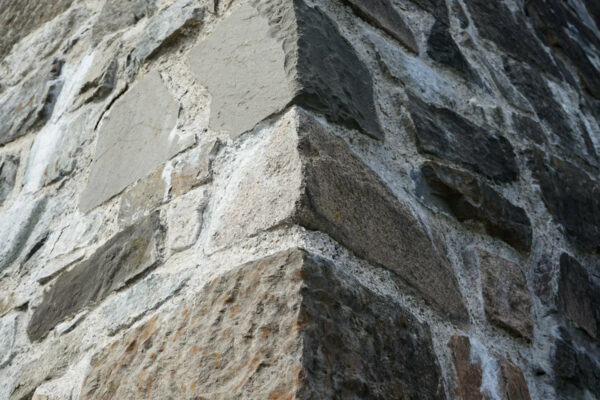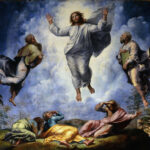Fifth Sunday of Easter (Year A)
This Sunday’s Readings are once again developing the theme of the complex identity between Jesus and the Father. Here we’re facing the final revelations: teachings that are hard to accept -and even to understand- for the Jews. We could then again, underline the theme of the divinity of Christ. How easily confused are those who, not relying on Tradition, lose sight of the essential and chase after whims and feelings. To reiterate: it’s foolish beyond naive, to pretend to take the naked text as a natural starting point, analyze it superficially, and then dictate conditions to God, so that He reveals Himself in terms set by us, according to our tastes and prejudices (classic example: the Muslim who asks for a idiot-proof demonstration that, in the Bible, God is one and triune…) I mentioned this concept in pseudo-homily 8, to which I refer, and it’s a theme that I’ll try to develop further.
But for today I’d rather focus on the Second Reading.

Corner stones. There isn’t just one cornerstone, the most important part of the structure, below all the rest… We can see many smaller stones, they’re visibly imperfect… and yet they do their part, leaning on the main cornerstone
The theme of Jesus, the Cornerstone is of course recurring in the NT and in homilies.
For the most important and visible structural role of all, a stone that earlier had been rejected by the builders is eventually used.
It’s not always easy to notice how profound the impact of Christian culture was on our entire world. We aren’t able to realize it, especially today: most people no longer want to hear about their roots. There are many treasures of culture that run the risk of disappearing within a generation; to be thrown away out of superb ignorance. And among these we find this idea, of constructively subverting the prior order of things: recognizing the value of the wretched and the miserable; appreciating the case of the underdog who manages to unexpectedly win in the end; the idea of God who cast down the mighty from their thrones, and has lifted up the humble. The idea that Jesus Christ, as a crucified criminal, was thrown in the most disgustingly humiliating position, becoming less than human in the public eye, and yet salvation comes right from there! From that discarded and defeated crucifix.
It’s difficult to give enough emphasis to how much this idea has had a positive influence on the development of our society, even on extra-religious aspects.
Not only in terms of giving dignity to the least fortunate, the poor, the loser, the cripple, the slave. Think how difficult it’s become, today, to explain the sense of defeat intrinsic to the Crucified Victim: we can’t even imagine how shameful Jesus’ condemnation was for the mentality of the time. We are no longer willing to believe that an ignoble fate definitively demonstrates who a person is, let alone what value they have!
So much we have changed! For us, fates are not sealed, defeat still proves nothing, you are judged on your intentions, abilities and virtue, nothing else. And you’re still always a being of immense intrinsic value, even if you’re the worst criminal.
Some time ago we were distractedly watching a silly little movie for children, playing in the background, The Emoji Movie (2017). And, without wanting to reveal the plot, I may say I couldn’t help but notice that basically even that movie is, in its sidereal remoteness, still imbued with this specific Christian value: salvation comes precisely from the stone rejected by the builders.
How dynamic, capable of innovation, can be a society that takes for granted that the geniuses of science and culture can be born among mice, rags and sewage spills, compared to a society where only those born with a silver spoon in their mouth can get to higher places?
We could go on, discussing the caste system in India and, on the opposite side of the spectrum, the success stories of American self-made men (who, however, mortify this dynamic by narrowing their gaze to the strictly economic plane: damn money for a damned heresy).
Christianity gives abundant life because it helps you think differently. But on the other hand, the post-Christian society is sinister and deadly because it forces you, beginning from the usage of words, to think according to top-down ideological schemes, which demean the human being.
Listen again to what St. Peter says in the passage from his First Letter:
like living stones,
let yourselves be built into a spiritual house
to be a holy priesthood to offer spiritual sacrifices
acceptable to God through Jesus Christ.
Here, in this metaphor we too, in our small way, are recognized to be part of this great divine project. All right, OK. But now think of the idea of offering spiritual sacrifices: …look at a crowd entering a subway; think of two commentators arguing on TV, of a girl painting your nails, of a salesman in an electronics store; think of this art history professor, think of a couple of boys singing Thank God It’s Friday (meaning: our partying and getting drunk – at the very least – has to last from this evening till Sunday). Can you picture them offering spiritual sacrifices? Can you see them not laughing if you suggested them the idea? Can you contemplate the concept of them even beginning to understand what this is all about?
But I’ll dare to get to more uncorfomtable territory: how many priests nowadays speak correctly and courageously of sacrifice, and also know how to convey a sense of the sacred, of seeking holiness and a separate space for God, as an essential component of our life?
Otherwise, without prayer and without a basic fear of God, what kind of stone building are we going to build? There were 360-degree, far-reaching beneficial effects from Christianity, but only because there was a solid foundation in a shared faith. Without that, everything collapses.
Now, once this has been said, we can appreciate how that very same cornerstone, which is Christ, becomes (in a way that otherwise would utterly surprise us) a stone that will make people stumble,
and a rock that will make them fall!
A nuisance. Something that is again condemned to be thrown away. Incomprehensible and annoying. “A stumbling block to Jews and foolishness to Gentiles”.
But there’s more: Jesus’ followers become a societal problem, to be repressed by the law. This is Jesus and his witnesses (martyrs in Greek). And here we are, again. This has to become intense, as intensity is the name of the game for modernity.
Incidentally, don’t be surprised if we get back to a society where some people are considered inferior and unworthy, beyond redemption; a society where the innocent are condemned to death; where increasingly, the only thing that matters is the condition in which you were born, not the content of your character (being rich and privileged, of the right skin color, part of the right identity group…)










































